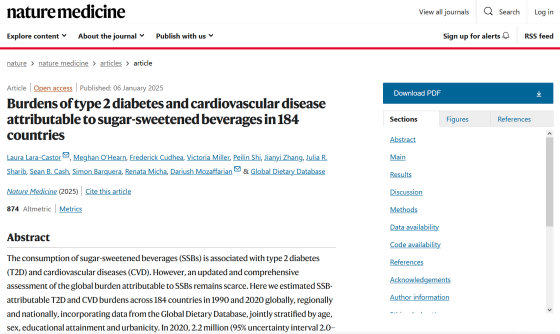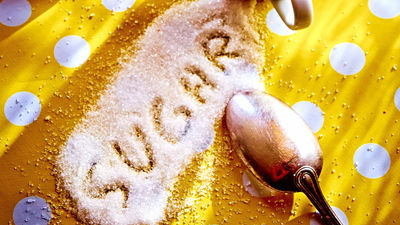Research reveals that sugary drinks are responsible for 2.2 million type 2 diabetes cases and 340,000 deaths from cardiovascular disease each year

Sugary drinks such as juices and carbonated drinks are enjoyed around the world, but in recent years there have been concerns that excessive sugar intake can have a negative impact on health. A new study published in the academic journal Nature Medicine has found that sugary drinks are responsible for 2.2 million type 2 diabetes and 1.2 million cardiovascular disease cases each year.
Burdens of type 2 diabetes and cardiovascular disease attributable to sugar-sweetened beverages in 184 countries | Nature Medicine

New study links millions of diabetes and hear | EurekAlert!
https://www.eurekalert.org/news-releases/1069329
Sugary Drinks Linked to Global Rise in Diabetes, Heart Disease - The New York Times
https://www.nytimes.com/2025/01/06/health/sugary-soda-beverages-diabetes-heart-disease.html
Sugary drinks are ingested and digested more quickly than solid foods, which leads to increased calorie intake without a sense of fullness, leading to obesity, and affect insulin and other regulatory pathways involved in sugar metabolism. Another problem is that sugary drinks are high in calories but have little nutritional value, so they tend to replace healthy foods.
To determine the specific health hazards caused by sugary drinks, which are a public health problem, around the world, a research team from Tufts University in the United States conducted an analysis using the Global Dietary Database , a comprehensive database of dietary habits around the world. The data included measured intake of sugary drinks in 184 countries around the world, as well as the incidence of type 2 diabetes and cardiovascular disease.
The research team defines sugar-sweetened beverages (SSBs) as 'beverages with more than 50 kcal per 8 ounces that contain added sugar.' This definition does not include 100% fruit or vegetable juice with no added sugar, non-caloric beverages with artificial sweeteners, or sweetened milk.

The analysis showed that 2.2 million new cases of type 2 diabetes and 1.2 million new cases of cardiovascular disease were associated with sugary drinks in 2020 alone. This means that 9.8% of all type 2 diabetes cases and 3.1% of cardiovascular disease cases are caused by sugary drinks. In addition, it was estimated that approximately 340,000 people worldwide died from type 2 diabetes or cardiovascular disease associated with sugary drinks in 2020.
Regionally, the majority of cases attributable to sugary drinks were in sub-Saharan Africa and Latin America, where sugary drinks were responsible for more than 21% of new cases of type 2 diabetes, while in Latin America and the Caribbean, sugary drinks were associated with approximately 24% of new cases of type 2 diabetes and more than 11% of new cases of cardiovascular disease.
Colombia, Mexico and South Africa are particularly affected by sugary drinks. More than 48% of new cases of type 2 diabetes in Colombia were attributable to sugary drinks, and about 30% of new cases of type 2 diabetes in Mexico were linked to sugary drinks. In South Africa, 27.6% of new cases of type 2 diabetes and 14.6% of new cases of cardiovascular disease were attributable to sugary drinks.
Globally, sugar-sweetened drink intake was higher among men than women and among younger people than older people. In sub-Saharan Africa, South Asia, Latin America and the Caribbean, more educated adults consumed more sugar-sweetened drinks, while less educated adults in the Middle East and North Africa consumed more sugar-sweetened drinks.
In the figure below, 'a' shows the number of type 2 diabetes patients caused by sugary drinks per 1 million population, and 'b' shows the number of cardiovascular disease patients caused by sugary drinks per 1 million population. In both cases, the number of patients is high in Africa, the Middle East, and the Americas.

The New York Times pointed out that beverage companies facing declining sales in North America and Europe are focusing on developing countries in Africa and Latin America. 'Regulators and policymakers respond well to tragic deaths such as aviation accidents and terrorist attacks, but the much greater death and suffering caused by sugary drinks is hidden and unimpressed. This needs to change,' said Dariush Mozaffarian , a professor at Tufts University and lead author of the study, in a statement to The New York Times.
The research team calls for a multifaceted approach to reduce the harm caused by sugary drinks, including public health campaigns, restrictions on advertising sugary drinks, and taxation of sugary drinks. In the UK, where the 'Soft Drinks Industry Levy (SDIL)' - a so-called sugar tax - which taxes drinks containing more than 5g of sugar per 100ml, has been introduced, it has been reported that the amount of free sugar consumed by children from drinks has been halved.
Survey results show that 'sugar tax' cuts sugar intake from juice by half - GIGAZINE

Related Posts:







